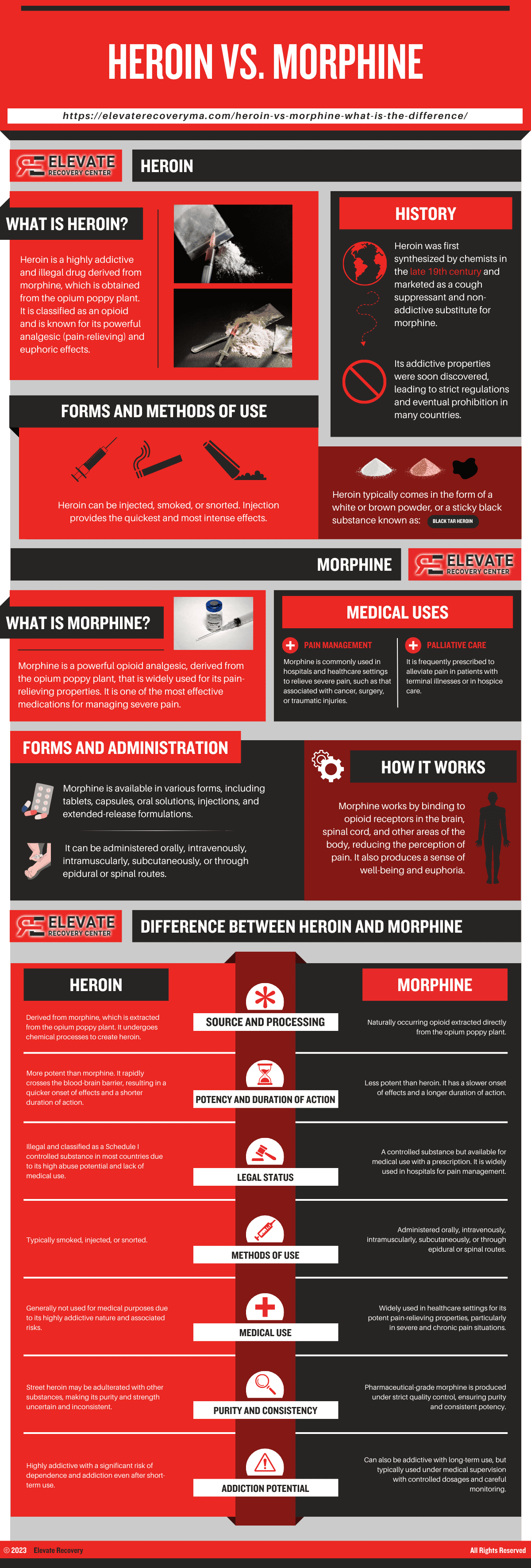WHAT IS HEROIN?
Heroin is an illegal potent opioid drug that is derived from morphine, a substance found in the seed pod of the opium poppy plant. It comes in the form of a brown or white powder or a sticky brown substance known as “black tar heroin.”
Heroin was first manufactured by the producer of Aspirin, The Bayer Company. The Bayer Company started producing heroin on a commercial scale in 1898, stating that heroin was a “wonder drug” that could treat pain and respiratory illnesses better than codeine or morphine.
However, by the 1910s, opioid users had also discovered heroin and rates of heroin abuse and addiction began to grow. Until 1914, heroin could be bought over the counter without a prescription as it was sold as an unregulated medication. But in 1924, the Anti-Heroin Act outlawed heroin for both medical and recreational purposes due to its addictive properties.
Heroin remains illegal today and is a major player in the United States’ opioid crisis. In 2021, nearly 1 million people were addicted to heroin and almost 10,000 died as a result of an overdose involving heroin.[3]
WHAT IS MORPHINE?
Morphine is a non-synthetic narcotic drug that is used for the treatment of pain and cough.[4] It works by reducing pain and interrupting pain signals between the brain and the body.
Morphine was discovered in 1803 and is one of the world’s oldest pain relievers and is used to develop other opioid drugs, such as codeine, oxycodone, hydrocodone, and fentanyl. However, by the 1850s, morphine was known to be highly addictive and had caused many overdose deaths among Civil War soldiers. Those who didn’t overdose ended up addicted to the drug.
In 1906, morphine was regulated under the Pure Food and Drug Act of 1906. Today, morphine remains a commonly prescribed and abused opioid painkiller.
EXPLORING THE DIFFERENCES BETWEEN HEROIN vs. MORPHINE
While heroin is derived from morphine and both drugs have similar side effects, there are a few key differences.
Legal Status and Medicinal Use
One of the biggest differences between heroin vs. morphine comes down to legal status. Heroin is illegal and has no accepted medicinal use, so it is designated as a Schedule I controlled substance. Morphine, on the other hand, is a Schedule II controlled substance, indicating a high potential for abuse but also accepted medical use.
Unlike heroin, morphine is highly regulated as a prescription and may be prescribed for pain relief. It is available in various forms, including oral tablets, injections, and extended-release formulations.
Chemical Makeup
Heroin and morphine are both opioids, and heroin is made from morphine, however, they are different when it comes to the chemical structure. Morphine is naturally-occurring and can be found in the seed pod of the opium poppy plant. Heroin, on the other hand, is a semi-synthetic opioid that is created by chemically modifying morphine molecules through a process called acetylation. This results in a more potent, fast-acting high.
Potential for Abuse and Dependence
Both heroin and morphine have a high potential for abuse and can lead to addiction. However, heroin is considered more addictive due to its rapid onset of action and increased potency compared to morphine. Heroin addiction can develop rapidly, as the drug stimulates the brain’s reward system, leading to intense cravings and compulsive drug-seeking behaviors.
Morphine, when used under medical supervision and according to prescribed guidelines, carries a lower risk of addiction. However, abusing morphine can still lead to addiction and withdrawal symptoms upon cessation.
Health Risks
Both heroin and morphine share common side effects associated with opioid use, such as nausea, vomiting, constipation, drowsiness, respiratory depression, and sedation. Additionally, the use of opioids like heroin and morphine can increase the risk of overdose, which can result in coma or death.
However, heroin poses additional risks due to its impurities and the unpredictable potency of street drugs. Contaminants in heroin can lead to infections, abscesses, and other health complications. Sharing needles for heroin injection also increases the risk of bloodborne illnesses such as HIV/AIDS or hepatitis C.
Finally, heroin is more likely to be laced with fentanyl, an opioid that is 50 times stronger than heroin and 100 times stronger than morphine. Fentanyl is the leading cause of opioid-related overdose deaths today. As a result, people may be more likely to overdose when abusing heroin than they are when abusing morphine.
FIND HELP TODAY
Regardless of what opioid you are addicted to, opioid addiction is dangerous and potentially life-threatening. While both heroin vs. morphine addiction can have devastating effects, there are treatment options available to help individuals recover and overcome opioid dependence.
Medically supervised opioid detox programs can assist in managing the withdrawal symptoms associated with heroin and morphine cessation. Medications such as methadone and buprenorphine can be used in medication-assisted treatment to reduce cravings and stabilize individuals during the recovery process. Additionally, behavioral therapies and counseling can address the psychological aspects of addiction and provide individuals with essential coping mechanisms and support systems.
If you or a loved one are struggling with opioid addiction, please contact our team at Elevate Recovery Center today to learn about your treatment options.
References:
- National Institute on Drug Abuse (NIDA): Heroin Drug Facts, Retrieved June 2023 from https://nida.nih.gov/publications/drugfacts/heroin
- National Library of Medicine: The history of heroin, Retrieved June 2023 from https://pubmed.ncbi.nlm.nih.gov/11862675/
- National Institute on Drug Abuse: What is the scope of heroin use in the United States? Retrieved June 2023 from https://nida.nih.gov/publications/research-reports/heroin/scope-heroin-use-in-united-states
- Drug Enforcement Agency (DEA): Morphine Drug Fact Sheet, Retrieved June 2023 from https://www.dea.gov/sites/default/files/2020-06/Morphine-2020.pdf


